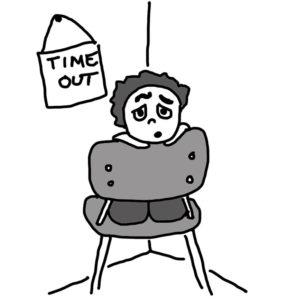
The other day, I had received a flattering review on my book “A Grownup Guide to Effective Crankiness.” This female reviewer wrote:
“If only the author was female. I’d love a book like this on menopause.”
It is true that I am not a woman, and I would not dare to write on the hot flash afflictions women may carry as a result of going through menopause. However, as a CrankaTsuris expert, I do have the solution to CrankaTsuris Menopause. The reason that I can do that is that I just got married. Not only did I just get married to a woman who I love dearly and with whom I have been together for close to nine years, but she happens to be right in the middle of her menopause cycle. I have been with her from the beginning of this situation, and we got married just so I can see this cycle calmly fade away, just like a soft ocean wave retreating back into the ocean.

Before I provide you with my solution to this problem, part of this problem arises from the wedding vows we take. If we examine those vows closely, we can understand the problem, and by understanding the problem, we can then come up with a proper solution.
First, I have to tell you the story of my parents. It is a lovely story. My father emigrated to Israel after World War II, and worked for ZIM Shipping Company. My father essentially worked full time on a ship, but he went to different ports of call, and sure enough, one of stops was in New York.
My father then somehow arranged to have a blind date with my mother. My father took my mother to the Horn and Hardart Automated Coffee Shop that was located on 42nd Street near the United Nations. He bought my mother a cup of coffee for five cents, and right there on the first date, my father proposed to my mother to get married. My mother, amazingly enough, said “Yes.” They then got married in New York, New Jersey and Connecticut because they believed if they got married in enough states, it would be easier for my father to become an American citizen.
My parents would always explain to me that the reason they did this was because they were “Greenhorns.” Growing up, I was convinced that “Greenhorn” was actually my real last name.
Years later, I asked my mother how can she say yes on the first date after just a cup of coffee. My mother smiled at me, almost chuckling, and said in her syrupy sweet voice:
“He looked like a hard worker.”
That was the only criteria for my mother so it was really easy for her. However, the wedding vows we take are way more complicated. We do not even answer the questions right. We are asked if we take this woman or man for better or for worse, and in sickness or in health. People think that it is a “Yes” or “No” question, but it is not. It is a choice. Which one? For better or for worse? In sickness or in health? Of course, let’s imagine what fun we would have if couples did answer the question the right way giving serious consideration to the choices they are making.

Priest: Seymour, do you take this woman for better or for worse?
Seymour: You know, I would like to say better. But, my bride Zelda here gets very nervous. If I say “better,” it would put too much pressure on her. Anyway, I am not marrying a beauty queen. So, how much worse can worse be?
Priest: It can get a lot worse. This is what I here.
Seymour: I’ll take a chance. Put me down for “Worse.”
Priest: Zelda, do you take Seymour for better or for worse?
Zelda: Definitely better. You know how it is. If you are picking from the bottom of the barrel, we can’t really get much worse. So, I am going with “better.”
Seymour: Look who is talking about “bottom of the barrel”! Priest, I want to change my answer to “better.”
Zelda: How does this work exactly? What if I think he is getting me “better,” but Seymour thinks I got worse. Or what if the opposite happened? To be honest with you, Seymour here wants me better. I do not know if I can do better.
Seymour: I said better. You have to do better. That is why the priest gives us the option.
Zelda: What a hypocrite you are.
Turning to priest, Zelda then said: You know what song Seymour used to always sing to me? It was Billy Joel. “Don’t go changing to try to please me. I don’t want you to work that harrrrrd! I love you just the way you are.” Turning to Seymour, Zelda exclaimed: Apparently not! It is a bunch of bullcrap!
Seymour: Zelda is right you know. But, I have a solution. How about we take both “for better” and “for worse”. Sometimes we are better, and sometimes, we are a bit worse. It gives us a little flexibility.
Priest: I can only do one or the other. If you want both “for better and for worse”, you do not see a priest. You both have to go to a lawyer.
Seymour: A lawyer?
Zelda: That can be expensive. What are these lawyers going to do.
Priest: I can tell you. It is very complicated. The lawyers negotiate the terms of what is exactly better, and what is exactly worse. There is an arbitration clause that requires you both to arbitrate if one person is worse when the person supposed to be better, or better when the person supposed to be worse. With any dispute, you hire the lawyers all over again. It would cost you at least a couple hundred thousand dollars.
Seymour: We can’t afford that. I will go with worse. It makes it so much easier.
Zelda: I will go with worse too.
Seymour: Zelda, what do you say. Let’s not start this whole thing over with the “in sickness” or “in health”. We will both go for “in sickness”.
Zelda: You are such a smart man. “In sickness” it is! I love you Seymour!
Seymour: I love you too, Zelda!
This story shows how when two people are in love, they may not give much thought to “for better or for worse”, or “in sickness or in health”. The answer is always yes, but they are only focused on the “for better” and “in health” part. So, when I got married, I did put thought into this, and in particular, the problem of CrankaTsuris Menopause.
The deal I gave my bride, and the one she gave me, is that we both have to be “Normal” 75% of the time. However, we get to be “Crazy” 20% of the time, and “Insane” 5% of the time.
This is a great deal. If you lay out 300 days, this means you get to be completely insane on fifteen of those days, and you get two whole months of crazy.
Now, you may think this solution is a bit crazy, but hear me out. The problem with people who are insane buy into the deal that they are required to be 100% normal, and they are not permitted to be insane. You see the problem here? If you are insane, but not allowed to be insane, you are left with one alternative. You have to convince your partner that you are not insane, and in fact, because your partner believes that you are insane, the only reasonable conclusion that you can come up with is that your partner is in fact insane. You partner, who up to this point, was not in fact insane, now goes insane because your partner has been accused of being insane when, in fact, you were insane all along.
Because of this, my solution makes complete sense. You are feeling a bit insane, but that is okay. You are allowed 5% insanity. You are using up what you have been given. In fact, if you do not use it up, you insanity allowance would all go to a complete waste. Also, if we have used up our “Insanity quota”, we can then start to dip into the 20% crazy allotment.
And, if one partner is a bit insane, or a bit crazy, it is always okay. Our marriage vows include both a bit of insanity and a bit of craziness, and of course, a whole bunch of normal. Just remember. By embracing the insanity and craziness, and not just trying to put it on each other, we find the solution to CrankaTsuris Menopause.




